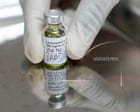A drug with the potential to “end the HIV pandemic” will launch in the US this week – as a new study reveals it could be sold for 1,000 times less than its possible price tag.
Lenacapavir, given as a twice-yearly injection, can prevent someone from being infected with HIV, according to clinicaltrial results.
US regulatory approval is expected on 19 June, and manufacturer Gilead is being urged to keep the cost as low as possible.
The company has not yet made the price of the drug public, but ithas been estimatedreportedthat it is likely to be on par with current preventive medications at about $25,000 (£18,400) a year. As a treatment for people already living with HIV, it costsabout $39,000 annually.
It could, however, be made for only $25 (£18.40) a year – including a 30% profit margin – analysis from the University of Liverpool and others suggests.
Dr Andrew Hill, one of the researchers, said making lenacapavir unaffordable in countries with HIV epidemics would only make things worse.
“Even high-income countries will not be able to afford wide scale use of lenacapavir at prices above $20,000 a year.”
Hillhad calculated a generic price of $40 annuallylast year, but said the interest from generic manufacturers had warranted new analysis. This showed lenacapavir could be mass produced for $35 to $46 a year, if there was annual demand for 2m doses, falling to $25 at scaled up production of 5m to 10m doses each year.
In 2023 there were 1.3m new HIV infections. The World Health Organization saysabout 10 million people need to take HIV prevention drugsin order to achieve global goals.
Dr Winnie Byanyima, UNAids executive director, said: “We have been urging Gilead to make lenacapavir available and affordable for all who need it. Dr Hill’s research indicates that this gamechanging innovation could – within a year of launch – be produced and sold for just $25 per person per year. To charge 1,000 times more for a medicine with pandemic-ending potential would be abhorrent. We cannot end Aids with medicines that are so costly.”
Amidwidespread fears that aid cuts will see a reversal of decades of progressin controlling HIV, Byanyima said long-acting preventive medicines such as lenacapavir could offer a breakthrough for countries and “turn off the tap of new infections”.
She called on Gilead to “do the right thing, save countless lives, and end this pandemic”.
Gileadhas agreements with six generic companiesto allow the production of low-cost versions of lenacapavir for120 low-income countries, and has promised to supply doses for about 2 million people at no profit before generic supplies come to market.
European regulatory approvals,facilitating approval in many low- and middle-income countries, are expected later this year.
But campaigners say countries where a third of new HIV cases occur are excluded by the Gilead scheme – including Brazil, Argentina, and parts of eastern Europe.
In a statement, Gilead said the company “understands the importance of access for lenacapavir for PrEP [pre-exposure prophylaxis] if it is approved, and we’re taking steps at unprecedented speed to plan for access to lenacapavir for PrEP globally – particularly in low- and lower-middle-income countries where the need is greatest”.
The company said external price estimates were based on assumptions of higher use of HIV prevention drugs than currently, or projected. It said global price planning was in progress and would take into account “nearly two decades of research and development, constant learning and iteration, and manufacturing investments to deliver lenacapavir at scale”.
